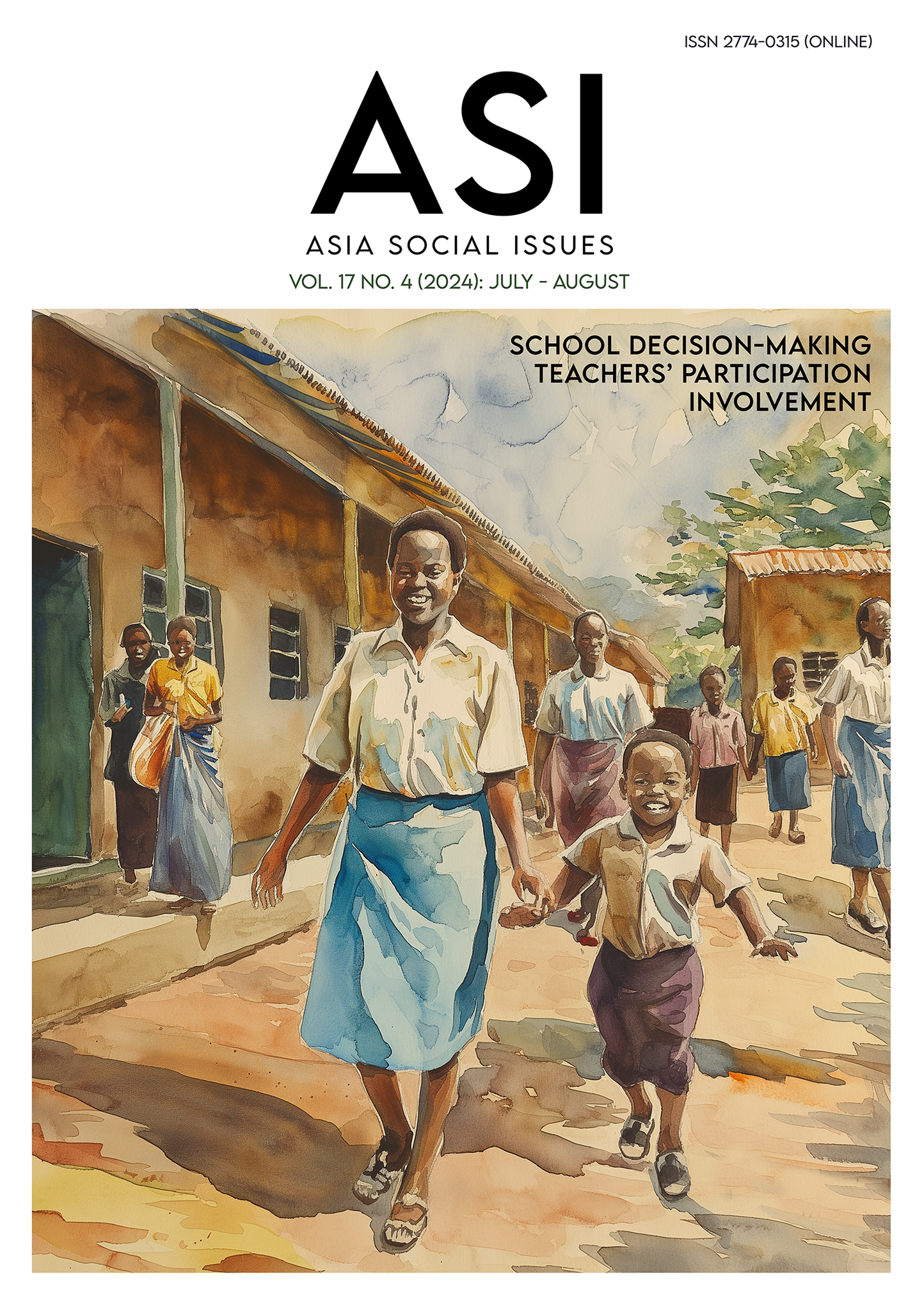Sexy Jaosue: Consuming Hindu Deities and Homoerotic Materiality in Thailand
Main Article Content
Abstract
In this article, I describe the material and objectified conditions that occur with Jaosue Watcharakorn’s complex operations that take Ganesha’s divine sanctity in Hinduism to reconstruct a sexy and attractive masculine body that attracts gay people. I found that religious spatiality and temporality were not separate from secular matters, but they broke the disciplined order and created the unconventional form of embodiment. Jaosue’s self-manifestation is conducted upon the interacted complexity of religious objects, sexual desire, and consumption of luxury goods. However, the study of materiality must also be considered in the context of the relational powers arising in the operations of various objects organized by capitalist commoditization. I understand daily material practices as a reflection of Thai society, where the disadvantaged are struggling to achieve financial success under the inefficiency of the Thai government. Only people with strong power networks can access opportunities and success within such struggles. Jaosue’s story indicates that to make himself a possible material entity he must constantly strive and attempt to gain sources of power.
Article Details

This work is licensed under a Creative Commons Attribution-NonCommercial-NoDerivatives 4.0 International License.
Copyright: CC BY-NC-ND 4.0
References
Bataille, G. (1985). Base Materialism and Gnosticism (pp. 45-52). In Stoekl, A. (Ed.). Visions of Excess: Selected Writings 1927-1939. Minneapolis: University of Minnesota Press.
Bennett, J. (2010). Vibrant matter: Apolitical ecology of things. Durham, NC: Duke University.
Duangwises, N., & Jackson, P. A. (2023). Evolving Thai homoeroticism, male nidity, and multiple masculinities in gay magazines since the 1980s-2010s. Asia Social Issue, 16(2), 1-24.
Eoseewong, N. (1991). Spataility in Thai thought. Sinlapa-watthanatham, 13(2), 180-192.
Farrell, W. C., & Phungsoonthorn, T. (2020). Generation Z in Thailand. International Journal of Cross Cultural Management, 20(1), 25-51.
Gorman-Murray, A. (2008) Reconciling self: Gay men and lesbians using domestic materiality for identity management. Social & Cultural Geography, 9(3), 283-301.
Henare, A., Holbraad, M., & Wastell, S. (2007). Thinking through things: Theorising artefacts ethnographically. New York: Routledge.
Hegel, G. W. F. (2018). The phenomenology of spirit. Cambridge Hegel Translations. Translated by Pinkard, Terry. Cambridge: Cambridge University Press.
Henare, A., Holbraad, M., & Wastel, S. (2007). Thinking through things: Theorizing artifacts ethnographically. London: Routledge.
Ingold, T. (2011). Being alive: Essays on movement, knowledge and description. London: Routledge.
Jackson, P. A. (2020). Beyond hybridity and syncretism: Kala-Thesa contextual sensitivity and power in Thai religious and gender cultures. Journal of Anthropology, 3(1), 4-37.
Jewpattanakul, Y., Phuphaibul, R., Loveland-Cherry, C. J., Nityasuddhi, D., & Suwonnaroop, N. (2013). Factors Influencing well-being among families with adolescents living in and around Bangkok, Thailand. Pacific Rim International Journal of Nursing Research, 14(3), 235-248.
Keane, W. (2007). Christian moderns: Freedom and fetish in the mission encounter. Berkeley: University of California Press.
Klein, N. (1999). No logo: Taking aim at the brand bullies. London: Picador.
Klein, N. (2009). No space, no choice, no jobs, no logo: Taking aim at the brand bullies. Toronto: Vintage.
Latour, B. (2004). Why has critique run out of steam? From matters of fact to matters of concern. Critical Enquiry, 30(2), 25-48.
Marx, K. (1990). Capital vol. 1. Translated by Ben Fowkes. London: Penguin Books.
Maud, J. (2007). The sacred borderland: A buddhist saint, the state, and transnational religion in southern Thailand (Master’s thesis). Sydney: Macquarie University.
McLean, S. (2015). Materiality and Culture (pp. 765-771). In Wright, J. D. (Ed.). International encyclopedia of the social & behavioral sciences (2nd eds.). Oxford: Elsevier.
Miller, D. (1987). Material culture and mass consumption. Oxford and Cambridge, MA: Basil Blackwell.
Miller, D. (2005). Materiality: An introduction (pp.1-50). In Miller, D. (Ed.). Materiality. Durham and London: Duke University Press.
Muecke, M. A. (1992). Monks and mediums: Religious syncretism in northern Thailand. Journal of the Siam Society, 80(2), 97-104.
Nicholson, G. J., & Kongthaewtong, P. (2021). Thai generation Z: The evolving paradigm of leadership in the kingdom of Thailand. International Journal of Business and Social Science, 12(8), 92-108.
Strathern, M. (1990). Artefacts of history: Events and the interpretation of images (pp. 25-44). In Siikala, J. (Ed.). Culture and History in the Pacific, Transactions no.27. Helsinki: Finnish Anthropological Society.
Pinthongvijayakul, V. (2019). Performing alterity of desire: Bodiliness and sexuality in spirit mediumship in northeast Thailand. American Anthropologist, 121(1), 101-112.
Sangkhawasi, T., & Johri, L. (2007). Impact of status brand strategy on materialism in Thailand. Journal of Consumer Marketing, 24(5), 275-282.
Van Esterik, P. (1999). Repositioning Gender, Sexuality, and Power in Thai Studies (pp.275-289). In Jackson, P. A., & Cook, M.N. (Eds.). Genders and sexualities in modern Thailand. Chiang Mai, Thailand: Silkworm Books.
Van Esterik, P. (2000). Materializing Thailand. New York: Berg.
Viveiros de Castro, E. (1998). Cosmological perspectivism in amazonia and elsewhere, four lectures delivered 17 February-10 March at the Department of Social Anthropology. US: University of Cambridge.
Watchravesringkan, K., & Dyer, B. (2007). Materialism among young consumers in China and Thailand: An Exploratory Study. Alliance Journal of Business Research, 3(1), 21-35.
White, E. (2017). Rethinking anthropological of spirit possession and Theravada Buddhism. Religion and Society: Advances in Research, 8, 189-202.
Wijitwatchararak, K. (2020). The political alertness of new generation in Thailand. Journal of Yanasangvorn Research Institute Mahamakut Buddhist University, 11(1), 91-103.


